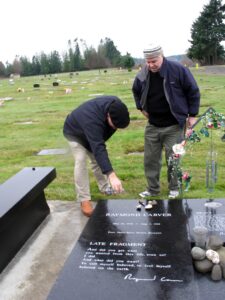John Rowley, the man who taught me how to shuck oysters, passed away on October 4, 2017. I will always remember him. He forged his zeal for life out of an enormous sadness.

Here’s a story about him:
Sex, Death & Oysters, Chapter Nine: Will Shuck for Food
…It was a chilly overcast day, and we hadn’t gone far before Rowley pointed out a two-story house built in the 1920s that was much fancier than any of the others in the neighborhood. “That’s Raymond Carver’s house,” he said.
I didn’t remember Raymond Carver’s short stories right away. But Rowley reminded me about Carver’s bleak strain of fiction and the spiritual emptiness of the people who inhabited it. After a miserable alcoholic life, Carver had spent his last ten years at the house in Port Angeles, staying sober and writing stories about the shabby lives of hopeless middle-class families in a semi-rural landscape not unlike Port Angeles, Washington.
Rowley identified with Carver. When I asked him about his ethnicity, he told me he didn’t have one. He grew up in Alaska and Oregon with two alcoholic parents, he said. When he left home, he became a commercial fisherman. For ten years, he spent summers fishing in Alaska and winters bumming around Europe, mostly France. He had bouts with depression and heavy drinking.
In the mid-1960s, Rowley’s first daughter was hit by a drunk driver and died a slow death. He and his wife moved to Portugal and had another daughter. But the marriage didn’t withstand the tragedy.
Rowley credits the passage about oysters from A Moveable Feast, Hemingway’s posthumously published memoir of 1920s Paris, with changing his life. He was intrigued by the idea that something you ate could give you a positive outlook.
Rowley told R.J. Apple Jr. that after reading the passage in his shabby Paris hotel room, he resolved to “eat lots of oysters, as many as I could afford, and make it my quest to learn about oysters and how they are cultivated, distributed and consumed.”
As I ate the oysters with their strong taste of the sea and their faint metallic taste that the cold white wine washed away, leaving only the sea taste and the succulent texture, and as I drank their liquid from each shell and washed it down with the crisp taste of the wine, I lost the empty feeling and began to be happy and to make plans.
— A Moveable Feast, Ernest HemingwayHe started by getting on the Metro and spending the last of his money on a feast of oysters and wine at Le Dome, he told me. When he returned in subsequent years, he educated himself, visiting oyster farms, oyster distributors and oyster restaurants all over France. Oysters gave his life a purpose.
When he started working with oyster marketers, Rowley was a purist who wouldn’t back down from his version of the gospel. When another Washington State oyster entrepreneur named Bill Webb started cultivating European flat (O. edulis) oysters and selling them as “Belons” in the early 1980s, Rowley was outraged. “I told him, you can’t call them Belons, because the Belon River is in France.”
The two men were asked to speak about oysters at various educational events, and their talks invariably ended up becoming debates. Eventually Bill Webb started calling his American-raised European flat (O. edulis) oysters “Westcott Bay Flats,” and the two became friends.
As a goodbye gift, Rowley gave me a copy of Where I’m Calling From, Selected Stories by Raymond Carver. Some time later, I picked up the book and read the story called “A Small Good Thing.” In the story, a mother goes to a bakery and orders a birthday cake for her son. The little boy is hit by a car on the way to school and is taken to the hospital, where he goes into a coma. The baker keeps calling, angry that no one picked up the cake. In the end, the boy’s mother and father go to the bakery in the middle of the night and confront the abusive baker. The man is chagrined and apologizes profusely. He sits the couple down and gives them hot cinnamon rolls and coffee.
“You probably need to eat something,” the baker said. “I hope you’ll eat some of my hot rolls. You have to eat and keep going. Eating is a small good thing in a time like this,” he said. The resemblance to Rowley’s tragedy was uncanny, and so was the small good thing of eating something as a way of coming back to life.
Just before I departed Port Angeles, Rowley took me for a ride in the car. We parked at Ocean View Cemetery, which is located on a grassy cliff high above the gray waters of the Strait of Juan De Fuca. We got out and walked around in the light drizzle. Over the cliff, I could see the shoreline of Vancouver Island in the distance.
In one of the rows of the cemetery, Rowley pointed out the low dark stone that marked Raymond Carver’s grave. While we stood there, he produced two oysters and a small bottle of Jack Daniels with an inch left in the bottom from the pockets of his Goretex coat. He spilled a little oyster liquor on Carver’s grave as he shucked. We toasted Carver with oysters and warming slug of whiskey. Then we set the oyster shells and the empty bottle on the grave beside Carver’s name and took a picture.
